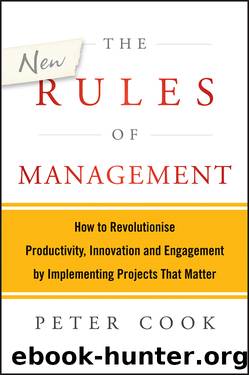The New Rules of Management by Peter Cook

Author:Peter Cook
Language: eng
Format: epub
Publisher: Wiley
Published: 2013-09-15T00:00:00+00:00
Fail 50 per cent
In any given project or endeavour, we can succeed or fail, and we can go about every project flat-out or half-hearted, which give us four options:
⢠Succeeding half-hearted. Some things we can only put a bit of ourselves into and still pull off. Nice when you do that, but generally this attitude is not going to be enough for pulling off the big things.
⢠Succeeding flat-out. These are the things that give us the greatest satisfaction â we have left nothing in the tank, and come out victorious.
⢠Failing half-hearted. This is playing safe. We can fool ourselves into thinking we didnât really fail because we didnât give it everything. Too much of this kind of behaviour is dangerous â we can get in the habit of failing without being responsible for the failure, and the habit of not giving our best.
⢠Failing flat-out. This can be the hardest, and it is by far the most important. All successful people and teams have had spectacular failures giving their all. It is the most important because without being willing to fail flat-out, weâll never succeed flat-out.
Failing flat-out is what we need to become comfortable with, and why I recommend that people aim to fail 50 per cent of the time. This applies to our innovative projects, not to everything we do. In the next chapter, we will come back to the distinction between responses, systems and projects. When responding to direct instructions or requests, or following systems, we generally want to get it right. So be a bit selective about when to apply the fail 50 per cent rule. Please donât tell the police officer who has pulled you over that Pete said fail 50 per cent and so now you only stop at every second red light.
In the right areas, allowing ourselves to fail 50 per cent of the time lets us risk failing flat-out. If we arenât able to risk failing at 100 per cent effort, then we will be half-hearted in everything we do, and we will never succeed flat-out either.
In Bull Durham, one of my favourite movies, Tim Robbinsâs character âNukeâ La Loosh is in the middle of a winning streak when he says something very profound about success and failure: âI love winning ⦠you know ⦠itâs like better than losing.â Emotionally heâs right, but in terms of building character and learning about yourself, failing flat-out beats winning every time.
So go out and fail, fail hard, fail often, fail spectacularly, fail at the right things and fail flat-out â 50 per cent of the time.
Commit completely
As we have seen, every project goes through three phases: start, persevere and complete. At the start, we need to commit completely to our projects. My favourite quote in the whole world encapsulates this. Scottish mountaineer W. H. Murray said:
Until one is committed, there is hesitancy, the chance to draw back, always ineffectiveness ... The moment one definitely commits oneself, then providence moves too. All sorts of things occur to help one that would never otherwise have occurred.
Download
This site does not store any files on its server. We only index and link to content provided by other sites. Please contact the content providers to delete copyright contents if any and email us, we'll remove relevant links or contents immediately.
Hit Refresh by Satya Nadella(9121)
The Compound Effect by Darren Hardy(8941)
Change Your Questions, Change Your Life by Marilee Adams(7753)
Nudge - Improving Decisions about Health, Wealth, and Happiness by Thaler Sunstein(7689)
The Black Swan by Nassim Nicholas Taleb(7104)
Deep Work by Cal Newport(7059)
Rich Dad Poor Dad by Robert T. Kiyosaki(6601)
Daring Greatly by Brene Brown(6501)
Principles: Life and Work by Ray Dalio(6413)
Playing to Win_ How Strategy Really Works by A.G. Lafley & Roger L. Martin(6218)
Man-made Catastrophes and Risk Information Concealment by Dmitry Chernov & Didier Sornette(6001)
Big Magic: Creative Living Beyond Fear by Elizabeth Gilbert(5753)
Digital Minimalism by Cal Newport;(5747)
The Myth of the Strong Leader by Archie Brown(5495)
The Slight Edge by Jeff Olson(5408)
Discipline Equals Freedom by Jocko Willink(5377)
The Motivation Myth by Jeff Haden(5202)
The Laws of Human Nature by Robert Greene(5169)
Stone's Rules by Roger Stone(5080)
